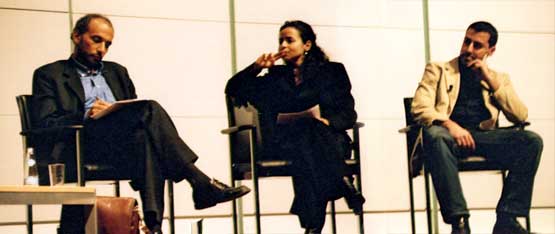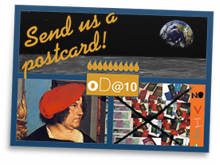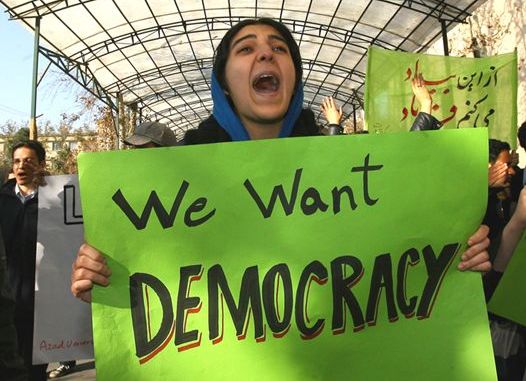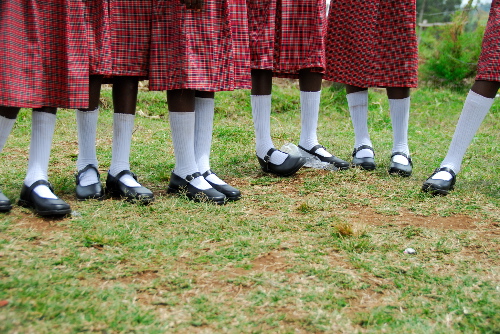Zakaria Hamidi is surprised at how many "Dutch people" have come along to the first public debate in Rotterdam organised by New Horizon, a newly-launched platform for discussion focusing on Islam in the Netherlands. Over 800 of us are packed in serried rows into a big conference hall in Erasmus University on a Friday night, mid-January, awaiting the arrival of "two men who have dedicated a lot of time, energy and heart to analysing the problems of disharmony between Muslims and non-Muslims, beginning with Belgium and France, but always aiming for European solutions – solutions for the world at large," in the words of the young chairwoman. It has taken Zakaria a year to bring his speakers together, and 200 people have already had to be turned away.
Both men have a considerable following, and on the surface seem to disagree about almost everything. Lebanese-born Dyab Abou Jahjah, president of the Arab European League (AEL) has been called the Belgian Malcolm X, while the young philosopher, Tariq Ramadan, as he will remind us tonight, has often been referred to as "the preacher of the banlieues". So our chair's closing remark that, "maybe by the end of the night, we will find out that both men would however like to join forces … in helping Muslims to freedom and peace," does little to dent the hopes of those who came wanting to hear a good row.
Among Rosemary Bechler's other interviews, essays and profiles in openDemocracy:
"Everyone is afraid: the world according to Abou Jahjah" (May 2004)
"A bridge across fear: an interview with Tariq Ramadan" (July 2004)
"Islam and democracy: an interview with Heba Ezzat" (May 2005)
Face to face
The speakers address specific questions, with a right of reply, starting with: is being a Muslim compatible with living in Europe – can Islam fit in? Tariq Ramadan offers a series of linked, philosophical arguments. First thesis: Islam is a universal religion based on a set of principles. Therefore, you do not have to decide whether it has to be subsumed within your European culture, or the other way around. The constitutions and legal frameworks of the European countries enshrine freedom of worship, and freedom of conscience. No one is going to tell a Muslim living in Holland, "you have to drink alcohol; you cannot fast during Ramadan". Ergo, "I can be fully Muslim and fully European." Moreover, as Muslims, it is said within your tradition, "you must respect the contract". A deeper understanding of your religion precisely obliges you to be a deeply committed "true and transparent" law-abiding citizen in the country in which you live. This is not against Islam or as an exception to the norm practised in majority Islamic countries: quite the reverse.
Ramadan's third premise concerns a new development. What we are now seeing is the emergence of European Islam as a cultural reality – not one but many cultures: "You know why? Go to France and you will see that you are not very French [laughter]. You are Dutch. So we have many cultures and it is not a problem. The universality of Islam does not exist in order to standardise the culture: it asks us to accept, in the name of your universal principles, the diversity of cultures. I am European by culture, Muslim by religion, Swiss by nationality, Egyptian by memory, and universalist in my principles! [much laughter] – and if you want to box me in, I will jump out of that box, and say – OK! I have multiple boxes!"
Ramadan is just warming up. The worst mistake that you could make, he urges his audience, is to be obsessed with your minority status as Muslims. There is no such thing as minority or second class citizenship in Europe. Politicians, he continues to enthusiastic applause, must also learn this same lesson: both those politicians who neglect the community in between elections and then come offering support for the building of a mosque at the last moment – thus using religion to get votes, rather than treating the citizen as he or she deserves; and those other politicians, like the French MP who described the young rioters to him as "those immigrants" and, when pushed, denied that they were "genuinely French". "What then is a genuine Frenchman?" Ramadan had asked him – "a white Frenchman?" He has little time for politicians and analysts determined to centre their analyses around "Islam, integration and identity", let alone those who turn fears of Islam to short-term electoral advantage, when the real issues are those of social and economic deprivation, racism and ghettoisation.
He concludes by urging Muslims in the audience to believe that they are "at home" and to contribute to their societies. The best contribution you could make is to help your society live up to its own ideals – "let us be citizens in this society – not only Muslim citizens, but Christians, Jews, citizens, Arabs, striving for more social justice, and to get rid of our mental, intellectual, cultural and religious ghettoes – all together. This is a challenge for all of us."

Onstage: Tariq Ramadan (left), Esma
Choho and Dyab Abou Jahjah (right). © Michael Rebehn.
Dyab Abou Jahjah rises to agree with "80% of what he has just heard", adding amicably that nobody will be surprised if he concentrates on the areas in which he disagrees. He immediately reformulates the opening question. Why should Muslims be so concerned about whether they fit into Europe? When citizens in the Netherlands, Belgium or France can see that these countries do not live up to their own constitutions, or EU or international conventions on human rights, "shouldn't we be changing them? My question is, is Europe as it stands today, compatible with democracy?" Put it this way, and of course some people are going to accuse you of an activism which is in bad faith, and an incitement to hostility. But why are these so-called democracies so unwilling to listen? The answer, Dyab Abou Jahjah suggests, is because Muslims in these societies are ethnically in a numerical minority; they are a minority as immigrants or the children of immigrants; and, even if you discount these aspects, due to the inequalities, exclusion and discrimination they suffer, they are in a minority of citizens who really criticise the democratic credentials of European countries, and who want to see profound change, "people who believe that a democracy cannot really be a democracy if it relies on a certain concentration of power and capital, and an international agenda focused on imperialism, colonialism and on being the lackey of the United States of America."
Once again, there is enthusiastic applause as Abou Jahjah concludes that what follows from this is a stark choice – between forgetting the forms of oppression and exploitation which brought you or your family to Europe in the first place, or aligning yourself with the oppressed and standing up for their rights as well as your own. This is not a question of some kind of nostalgia for your origins, or divided loyalty, it is matter of knowing where you stand on key issues of power in the world.
From this perspective, Tariq Ramadan's encouragement to Muslims to "feel at home" is "creeping assimilation". The comment about "Egypt being a memory" has particularly grated with Abou Jahjah, he explains afterwards. "The Third world is as real a presence today as Europe is, and tomorrow it will be oppressed and pushed into dictatorship and violence and all that follows from that. Tell me that you don't need to be Egyptian to struggle on behalf of the Egyptian people: I agree with you. But if you are, you have even more motivation. You don't say, 'I bailed out of there, but as a European of course I will look afresh at your grievances!'"
The passionate debate that follows these opening provocations has some interesting twists. Ramadan is completely opposed to Islamic schools or affirmative action where these might add to segregation from society: Abou Jahjah applauds both as tactical options, regarding recourse to such schools as understandable where mainstream education is dysfunctional and the state forbids girls to wear the hijab. Abou Jahjah has founded Belgium's Muslim Democratic Party: Ramadan thinks that Islamic political parties are the very worst way to organise oneself.
At one point, frustrated with the difficulty of capturing their differences, Abou Jahjah, who has been building a branch of the AEL in France, implies that "the preacher" is too keen to lecture the French rioters on their "responsibilities". He for one would like to put it on the record that he saluted not their violence – "they are using a traditionally French form of direct action, perfectly proportionate to the provocation they have suffered" – but their resistance. It is a rhetorical gesture and it certainly turns up the heat. Ramadan is adamant that his practical, grassroots credentials are as solid as Abou Jahjah's, and accuses him in turn of whipping up emotional support through protest because he too is "a politician", willing to deploy the populist and publicist methods that Ramadan abjures. This accusation of "emotionality" touches a raw nerve. Abou Jahjah, "gets enough of that thrown at him back in Antwerp!" As far as he is concerned, those French youngsters have advanced their cause far better than they would have done listening to Ramadan on "how a good Muslim should behave!" Ramadan accuses Abou Jahjah of "disrespect", and the audience begins to settle into something like the carnival atmosphere of a Wimbledon final.
Some have been trying to work out what these differences amount to for themselves. A man at the back proposes contrasting constituencies: Abou Jahjah speaks for "angry immigrants who feel socially excluded, while Ramadan's supporters want to canalise their anger into a more positive channel". A woman suggests that they look to the civil rights movement of the USA. Here was a similar dual and complementary approach, for "it was when they got afraid of Malcolm X that they started talking to Martin Luther King. Couldn't that work for these two strategies?"

The audience. © Michael
Rebehn.
After-reckoning
Two years ago, Tariq Ramadan was looking forward to his new teaching job at Notre Dame University, only to be denied a US visa (something he is contesting in the courts). What he wanted to talk about when we met later in London, however, is a rebuff on a larger scale: the dangerous emergence of an "ideology of fear" in Europe and elsewhere, no longer espoused by the far right alone. "My main concern is with those others who normalise their discourse and offer as common parlance an ideology that plays exactly the same role as one based on ideas, except that it is devoid of ideas or rationality and built out of emotions: a binary vision of Us and Them, virtual walls between us, Bush saying that he is the only one who can protect people against terrorism, Muslims feeling targeted. So we all feel ourselves to be victims and this throws us apart. We cannot build bridges or come together, or resist the primacy of a specific, dominant economy – because we are totally divided in the socio-political field. This is against a broader background of the everyday reality of racism, discrimination, ghettoisation."
Against this dangerous tendency, he sees another trajectory, one tantalisingly close in a Europe where large Muslim populations, in Britain, France and Germany at least, are reaching the stage where they feel "at home". He calls this the "integration of intimacy", when people are ready to make a commitment and to give something back to their societies. "This can be a virtuous circle. When you give something, you are not asked, 'Where do you come from?'" Fifteen years ago Ramadan began his work of convincing Muslim leaders that it was necessary to return to the scriptural sources and begin a European reformation of their own. "We still have this victim mentality which blames 'the Other' and which thinks of ourselves as minorities who need protection, rather than as people who can stand up actively for themselves in our societies. But things have been moving very fast on this front in the last few years, and we are coming forward with new answers and new perceptions."
For the last five years he has been building the European Muslim Network, bringing together men and women community leaders from eighteen countries, including Bosnia, Albania, Kosovo, Bulgaria, Turkey, Holland, "and it works very well. They are spreading these ideas of citizenship which we share." At the same time, he has been talking frankly to governments about the need to encourage a "critical belonging" in their Muslim communities. And now, no doubt due to the Madrid bombing, French riots and 7 July 2005 attacks in London, they are listening to him: an invitation onto the Task Force, set up in the wake of the latter by the British Government, is only one of numerous invitations he has received.
What he says to those governments runs something like this: "You cannot decide for the people who their leaders are … Mediators have to be working credibly from within communities trying to help people, and government too has to be sincere in its agenda. It has to ask itself, "do we just want people to follow someone who is following us? Or are we willing to facilitate a process towards autonomy? It is only if they choose the latter that those mediators will have any credibility." That is usually the sticking point: because "governments like control".
There are two golden rules. First, don't impose; facilitate these communities in what they want to do. Some areas simply require mutual recognition that there is a common interest in spreading a better understanding of who you are and where you live. In others, politicians tend to "Islamicise" problems rather than face up to deep socio-economic challenges: "It is very difficult sometimes, since many who experience these problems are under social pressures and are all too ready to essentialise their experience – that is the kind of background they come from. But we need a deconstructive approach which can distinguish the different challenges, whilst recognising that they are also related in quite specific ways."
Rule number two is that governments have to accept criticism. Being critical of your own society is a good sign of European-style "belonging". The problem, as Ramadan sees it, is that far too few non-Muslim European citizens are willing to accept that their Muslim counterparts have the same right. "All of a sudden you get a great deal of mistrust and muttering about double loyalties." This is where the ideology of fear reappears. "In this sphere of citizenship, we are beginning to hear today some of the allegations hurled at the Jews in the 1930s in Europe, who were also accused of 'double-talk, double loyalty, fifth column'."
Enter Abou Jahjah and his diaspora. Nothing could seem much more self-defeating to Ramadan than Abou Jahjah's stance. "He is constructing something self-protective out of this diasporic connection … nurturing that sentiment, which you can sense feeds into another victim mentality. I am totally opposed to this idea that you are not really here, but that you are part of something which is somewhere else." Fitting so obligingly into the "fifth column" fantasy, "that would be the worst kind of mistake!"
But in concentrating on diaspora rather than citizenship, Ramadan may be neglecting the AEL's strengths. Two years ago, the organisation survived a challenge from its then strong Islamist wing. The rejection of theocracies in its new vision statement prompted their walk-out. Islam, of course, remains part of the symbolic and cultural identity of many AEL members, but this in itself has no theological or political repercussions. The AEL clearly declares itself a multi-confessional campaign for democracy. It continues its energetic fight against Islamophobia, but this is from a democratic and an anti-racist, not a theological vantage point.
The same programme envisages democracy developing in what Abou Jahjah describes as a "radical leftwing" direction, as the "prevention of any and every kind of concentration of power". The AEL has been looking for new allies who share their critique of liberal democracy. Again, this is no mere defensive stance. It is clear that such open-ended discussions have a highly motivating impact on the lives of the young men and women who rush around in Abou Jahjah's company. Take, for example, his interest in ideological oppression. "Look at theocratic authoritarianism in Islam, where an exclusive group takes to itself the power to issue fatwas over and above society. This concentration of knowledge is as antipathetic to a healthy democracy as any concentration of capital."
Moreover, the sheer cheek and political humour of Abou Jahjah's stance is hard to reconcile with any "victim mentality". Placed in the context of the highly charged stand-off between the minority immigrant population and the majority in Antwerp, let alone the far right, Abou Jahjah's fondness for bringing issues out in the open and "challenging the boundaries of society", his talent for media moments and soundbites, and his pride in his movement, have a bravura all their own.
Dyab Abou Jahjah and Tariq Ramadan have both responded to the "cartoon row".
The AEL published their own offensive cartoons as a riposte to those in Jyllands-Posten, as well as publishing a series of articles
"Free speech and civic responsibility", Tariq Ramadan, (6 Feb 2006)
"At the crossroad of Islam, the West", Tariq Ramadan, (9 Feb 2006)
However, he has watched the Flemish far right moving from strength to strength. "The banning of Vlaams Bloc only allowed them to start up a new party with more clubbable members. In short, their persecution has not held them back. Pragmatically, it has helped them." This is one reason for his commitment to "absolute freedom of speech". The far right, he believes, have been protected from themselves by laws banning hate speech. "Of course, I don't believe people should call for violence or defame others: there are normal legal frameworks. But when it comes to political opinions and artistic expressions, they shouldn't be silenced. Especially in the arts, you really need to be able to give expression to extreme views that challenge what is acceptable." He has been honing a version of Voltaire's dictum for Ayaan Hirsi Ali, "I may not like what you say – and might rather that you shut up! – but I will fight for your right to say it."
He may call for mandatory affirmative action from government, but all Abou Jahjah"s instincts tend towards the longer term empowerment of public opinion. "Had banning the Vlaams Bloc led to their dissolution, it would still have been a bad idea, because they would have been destroyed, not by being totally unmasked in front of a population that will choose democracy rather than racism, but because the Establishment quashed it. That's not how I want to combat racism."
But what chance is there of such a mobilisation? The local context has its inevitably narrowing effect. The AEL collaborated with a far left party in the last elections in Belgium and will probably do so again this year, despite the fact that many of the latter's regular voters balked at standing on the same ticket as Muslims and Arabs. Recently, we have glimpsed just how rapidly options can narrow worldwide, when a handful of European media men decided to tweak Muslim "victim mentality" by the tail. The AEL website featured a return series of offensive cartoons, accompanied by the message, "After the lectures that Arabs and Muslims have received from Europeans on freedom of speech and on tolerance, and after many European newspapers republished the Danish cartoons … the AEL has decided to enter the cartoon business and to use our right of artistic expression. Just like the newspapers in Europe claim that they only want to defend freedom of speech and do not desire to stigmatise Muslims, we also stress that our cartoons are not meant as an offence to anybody and ought not to be taken as a statement against any group, community or historical fact. But if the time has come to break down all taboos, we certainly don't want to be left behind." However well-targeted the satire, this is ultimately a dead-end provocation.
But is the task of social transformation really any easier for Tariq Ramadan than his more confrontational Belgian counterpart? "Fifteen years ago", Ramadan told me, "I spent my time speaking to Muslim reformers who were in agreement about how we should deal with our Islamic texts. Today, I hear some of those same reformers speaking just like me, about the need to be fully European and fully Muslim at the same time. But we are no longer on the same wavelength, because we disagree about our context. They wish to be modern, and they confuse this with adaptation to the current structure of domination. Some of these Muslim leaders are really going to be on the right: they will join social liberal parties."
Anyone interested in a 90-minute DVD of the Rotterdam encounter should get
in touch with Rosemary at rosemary.bechler
@opendemocracy.net
So we come full circle to a sense of just how much, albeit in very different ways, these two men have in common. Despite the theatricals and the sparring, both speakers want to see an end to Muslim "victim mentality"; both are challenging people instead to be active in solving their own problems; both urge and promote active citizenship – not crude notions of nationality or mechanistic ideas of "integration" – in countries where there is increasing disillusionment with electoral politics; and both agree that being loyal to your country as a citizen entails being critical when that country is wrong. This may be part of the answer to Zakaria's question about his first debate: why were so many "Dutch people" there? Speaking as a member of Britain's weary electorate, faced with "new localism" as a cautious concession to political renewal, this was one of those rare evenings, thanks to Tariq Ramadan and Dyab Abou Jahjah, when politics suddenly seemed to matter a lot, to us all.















